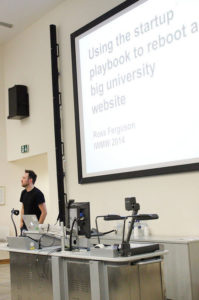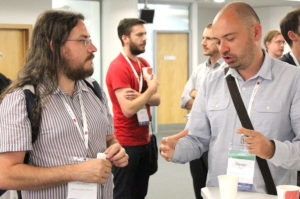Higher ed web managers conference write up
Last month a small group of colleagues from across the University attended the annual web managers conference in Newcastle. I asked everyone to answer three quick questions to give you a snapshot of what they thought of the event.
The Institutional Web Managers Workshop (IWMW) has been running for nearly 20 years now and I’ve been attending (most years) since joining the University Website Programme in 2006. This is probably the largest turnout by Edinburgh staff (apart possibly from 2012 when we hosted) and definitely the highest number of contributors with myself and Martin Morrey giving plenary talks, while Bruce Darby ran a workshop.
My talk at this year’s IWMW (previous blog post)
Martin and Neil’s preview presentations to University staff (previous blog post)
As ever, the conference organised a Lanyrd site to capture slides, write ups and various thoughts from contributors and attendees. I recommend you explore the resources, perhaps steered by the comments of colleagues below.
IWMW 2014 conference slides and writeups on Lanyrd.com
Quick conference write ups

The University of Bath’s Ross Ferguson seemed to get pretty much everyone’s vote for session of the conference.
I asked colleagues who attended to answer 3 quick questions:
- Why did you decide to attend the conference?
- What was the best presentation or session?
- What was the big trend or takeaway point you took from the conference?
Aldona Gosnell
My reason for attending the IWMW conference was mostly to keep my eyes open and to listen. Not under any pressure to deliver my own presentation or sell a product, I had the luxury of not having to worry too much about what to say, and the freedom to explore whatever caught my interest. The truth is that we (the CHSS Web Team) don’t get a chance to stop and look around very often.
It is hard to choose one talk out of the many expertly delivered and entertaining IWMW presentations this year. Perhaps the one that rung particularly true for me was “Using the Start-up playbook to reboot a big University Website” by Ross Ferguson (University of Bath) as I have a long standing interest in both start-ups and big university websites. To some extent it echoed the agile processes developed in my team – especially “release iteratively and often” and “provide ongoing support”.
I had my eyes open for any signs of the agile trend. I discovered that some of the delegates held the official SCRUM accreditation. It was interesting to meet with an official “Scrum Master” – Edele Gromley – and her team from the University of Kent. We have been trying to find our feet in the agile world for some time and come up with a successful recipe for the right balance between planning, doing and documenting. Had I been less worried about making a nuisance of myself, I would have asked her outright – do you really have the everyday stand-up 15-minute meeting, and is that working for you guys?
Aldona is the Web Team Manager at the College of Humanities and Social Science
Martin Morrey
1: I was speaking (!) + It’s the best way to find out what the rest of sector is doing.
2: Ross Ferguson. Reminded me that you can achieve change quickly if you are determined/stubborn/insensitive enough! Also, Paul Boag on Digital Transformation.
3: Digital Transformation. Rethink digital experience from scratch, and from the point of view of the end-user.
Martin is the Manager of the Web Integration Team in Information Services, with responsibility for portal, web development, and graphic design services.
Steven Ross
This was the first IWMW I had attended so wasn’t sure what to expect. I hoped it would be an opportunity to gain insight into industry best practice and also a chance to pick the brains of others facing similar challenges. It’s too easy to become stuck in your institutional ways, so a reminder that others face and address similar challenges, was revitalising.
The theme that weaved its way through many diverse presentations was digital transformation. To meet our users’ needs, we need to enable digital teams to function beyond organisational bureaucracy and dated processes. It’s clear that without organisational belief in the value of digital, we will continue to be perceived as facilitating the vision of others, rather the driver that brings improvement and keeps pace with fast evolving user demands.
Ross Ferguson’s presentation encapsulated these points well and unsurprisingly grabbed peoples’ attention. He countered the challenges we all face by presenting a brave new world where digital teams possess all the building blocks and resources required to deliver user focused services and products. Being able to quickly deliver and iterate products gives credence to this approach and generates confidence within the organisation and management.
I’ll be keeping an eye on Bath to see if the rhetoric rings true.
Steven is the Senior Digital Marketing Officer in Communications and Marketing.
Stratos Filalithis
As this was the first time I have attended the IWMW 2014 conference, my goal was to listen, learn and engage with people working within the UK Higher Education. It was a very nice opportunity to understand how common challenges are dealt in other institutions, as well as to understand different solutions or approaches to similar problems. All IWMW presentations were interesting and I was really happy that they covered an area of themes rather than focusing on a specific subjects.
I think that the presentation by Ross Ferguson (Head of the Digital team at the University of Bath), titled “Using the Start-up playbook to reboot a big University Website” really stood out, and was probably a taste of things to come on how to govern websites and digital services in general.
What was even more interesting was the following `birds of feathers` session around web governance itself where interesting conversations around how centralised and devolved models address the issue. It was apparent that there isn’t a magic solution as teams are structured in a way to suit each institution’s philosophy, business or organisational structure, while it’s too difficult to make radical changes even though they might directly fulfil their needs. It was really an optimistic touch, though, that there are initiatives, like the one at the University of Bath, which can rock the boat of web governance in UK Higher Education, if successful.
These are, certainly, interesting times and IWMW 2014 showcased the amount of change around us.
Stratos is the CMS Service Manager at the University Website Programme
Bruce Darby
I’d heard a lot of good things about the IWMW conference but the main reason for going was that I thought it would be a good opportunity to see what issues other education institutes around the UK were concentrating on and what their approaches were. If you never leave the University to go to conferences there is a real danger you can become institutionalised!
Ross Ferguson’s talk on using start-up techniques to reboot the University of Bath’s website was also the best of great bunch for me. I felt that it was an honest and open presentation about his working practises. He’s implementing some of the things we are setting out to do with the new Drupal CMS project we’re currently working on. 3 slides in particular I liked which seemed to say if you are using the agile methodology, which we are, be confident to follow these techniques and approaches through to the end however difficult it can become.
A few statements from the 3 slides stood out:
- Put users’ needs first.
- Keep things simple and consistent.
- Fail fast and lower risk.
And 2 final points were ‘too much product’ and ‘burn out’. I took the first to mean that there is lot of pressure to build too much into projects in one go and so ‘burn out’ is the inevitable outcome. If you are aware of this and constantly look out for it then at least that gives you some protection.
What surprised me was that quite a few universities seem to be embracing the term ‘digital’ even going as far as to include it in team and job titles. Paul Boag, who was at the conference, has been saying this for some time. It’s about incorporating digital into everything rather than seeing it something separate with its own strand and strategy.
Bruce is a Project Manager at the University Website Programme
And finally, my thoughts…
I attended the conference as I think it’s a fantastic forum to network with colleagues in the sector, to learn about what they’re up to; their challenges and successes. The presentations are always varied and typically of a high standard. So great from a professional development and a social point of view. I always follow up with a few people via email or Twitter afterwards and end up with a new reading list and a few new people I can call on for an opinion or a bit of help.
Everyone has been talking about Ross Ferguson’s presentations so I will pick on something else – there were a good few excellent sessions besides him. (Martin and I for starters!) I went to a workshop session run by Richard Prowse (coincidentally from the University of Bath) in which he went through the principles of Create Once, Publish Everywhere (COPE) and shared his experiences of trying to implement this with his university’s prospectuses. As I suspected, it’s been a big challenge for Bath, but it sounds like his hard work will pay dividends in the years to come. It’s not the first time I’ve seen Richard speak, and his experiences in the emerging field of content strategy are always worth hearing.
Richard Prowse’s blog – Content Bear
My big takeaway was the need for organisational change and executive-level buy-in to truly bring about digital transformation. We web management folk can do great things in our sphere of influence, but there comes a point where you have to accept that to be able to present information and services in a way that really works for the customer, then the culture of the organisation needs to change. This message came across loud and clear in the presentations of Ross Fergusson (on agile development), Paul Boag (on digital adaption) and Tracy Playle (on social media). It was also a major point in my own presentation about user experience.
I’d encourage you all to check out the conference materials available and consider coming along to next year’s conference.
IWMW 2014 conference slides and writeups on Lanyrd.com




4 replies to “Higher ed web managers conference write up”